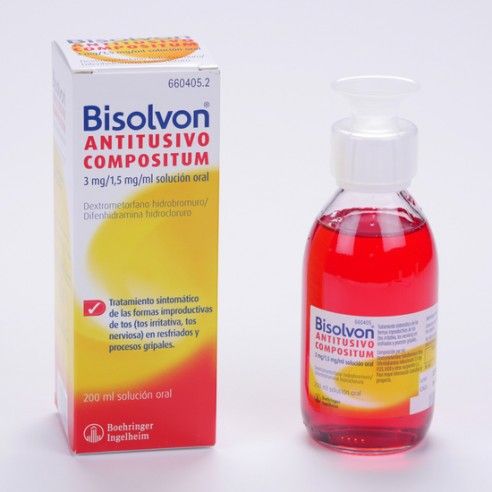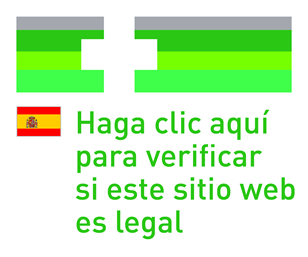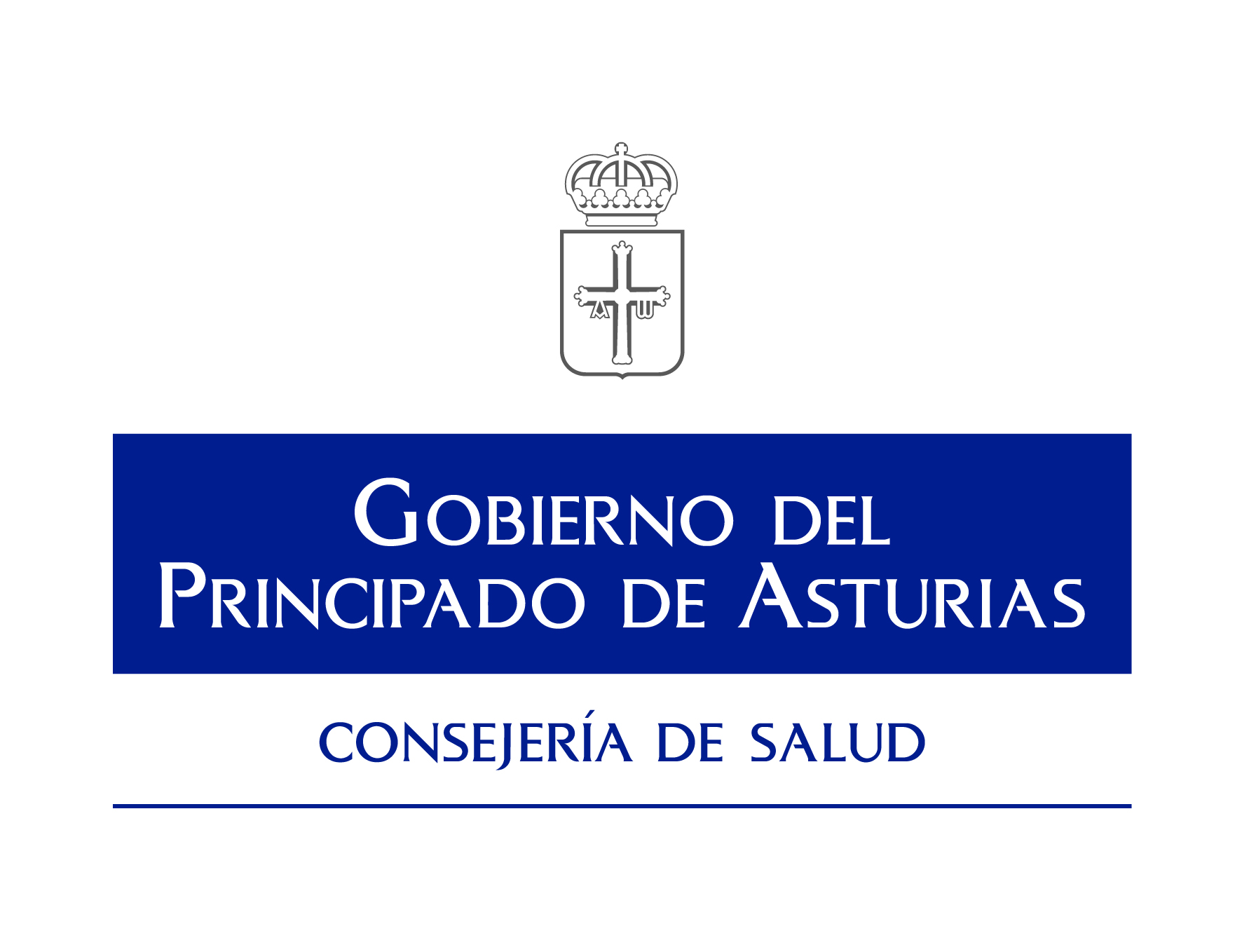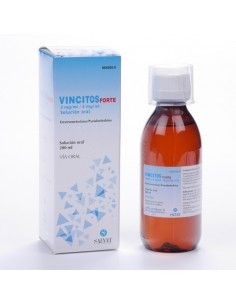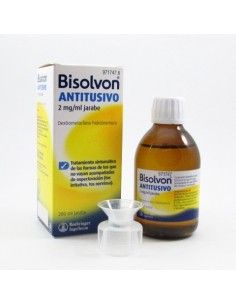" rel="noreferrer noopener">See package leaflet
BISOLVON ANTITUSIVE COMPOSITUM 3 mg/ml + 1,5 mg/ml ORAL SOLUTION from the laboratory Boehringer Ingelheim España, S.A.
Active substance: DEXTROMETORPHANE HYDROBROMIDE,DIPHENHIDRAMINE HYDROCHLORIDE
Excipients: SODIUM BENZOATE (E 211),SODIUM HYDROXIDE (E-524),PROPYLENE GLYCOL,GLYCEROL,SORBITOL SOLUTION 70%.
Read all of this leaflet carefully before you start taking this medicine because it contains important information for you.
Follow the instructions for taking the medicine exactly as described in this leaflet or as directed by your doctor or pharmacist.
- Keep this leaflet, as you may need to read it again.
- If you need advice or further information, ask your pharmacist.
- If you experience side effects, please contact your doctor or pharmacist, even if they do not appear in this leaflet. See section 4.
- If symptoms worsen or persist after 7 days, or if they are accompanied by high fever, skin rash or persistent headache, a doctor should be consulted.
Package leaflet contents
What is Bisolvon Antitussive Compositum and what is it used for?
2. What you need to know before you start taking Bisolvon Antitussive Compositum
3. How to take Bisolvon Antitussive Compositum
4. Possible side effects
5. Preservation of Bisolvon Antitussive Compositum
6. Package contents and additional information
What is Bisolvon Antitussive Compositum and what is it used for?
It is an antitussive medicine.
It is indicated for the symptomatic treatment of coughs that are not accompanied by expectoration (irritative cough, nervous cough) in colds and flu-like conditions.
2. What you need to know before you start taking Bisolvon Antitussive Compositum
Do not take Bisolvon Antitussive Compositum:
- if you are allergic (hypersensitive) to dextromethorphan, diphenhydramine or any of the other ingredients of this medicine.
- Children under 6 years of age should not take this medicine.
- if you have severe lung disease.
- if you have an asthmatic cough.
- if you have a cough with a lot of sputum.
- if you have a heart problem.
- breast-feeding women.
Take special care with Bisolvon Antitussive Compositum
This medicine should not be taken by people being treated with central nervous system depressants or monoamine oxidase inhibitor (MAOI) antidepressants (see section Use of other medicines).
Patients should consult a doctor before using this medicine: - with persistent or chronic cough
- with liver disease
- with atopic dermatitis
- who are sedated, debilitated or bedridden
- with prostatic hypertrophy, bladder obstruction or urine retention, low blood potassium levels - with increased eye pressure (glaucoma), hyperthyroidism, cardiovascular disease, high blood pressure (hypertension), bowel obstruction or with urine retention, stomach ulcer
- undergoing treatment with toxic ear medication
- with pain, swelling of the abdomen and fever.
Diphenhydramine may increase sensitivity to sunlight.
There have been cases of abuse with dextromethorphan-containing medicines in adolescents, so this possibility should be taken into account, as serious side effects may occur (see section If you take more Bisolvon Antitussive Compositum than you should). Use of other medicines
Tell your doctor or pharmacist if you are taking or have recently taken any other medicines, including medicines obtained without a prescription.
Do not take this medicine during treatment, or for 2 weeks after treatment, with the following medicines, as this may cause excitement, high blood pressure and fever higher than 40 oC (hyperpyrexia) or increase the effects of diphenhydramine:
- Monoamine oxidase inhibitor antidepressants.
- Selective serotonin reuptake inhibitor (SSRI) antidepressants (paroxetine, fluoxetine)
- Bupropion (used for smoking cessation)
- Isoniazid (used for infections)
- Linezolid (used as an antibacterial)
- Moclobemide or tranylcypromine (used to treat depression)
- Pargilin (used to treat high blood pressure)
- Procarbazine (used to treat cancer)
- Medicines for Parkinson's disease, such as selegiline
- Neuroleptics
Before taking this medicine you should consult your doctor if you are using any of the following medicines because it may be necessary to change the dose of any of them or to stop treatment:
- Medicines to treat heart arrhythmias such as Amiodarone or Quinidine.
- Anti-inflammatory medicines such as celecoxib, parecoxib or valdecoxib
- Medicines used to clear phlegm and mucus such as expectorants or mucolytics.
The use of antihypertensives in combination with this medicine may increase tiredness. The sedative effect of hypnotics, anxiolytics, barbiturates, antipsychotics and opioid analgesics may be enhanced.
Interference with analytical tests:
If you are going to have any analytical tests (including blood tests, urine tests, skin tests using allergens, etc...) tell your doctor that you are taking this medicine, as it may alter the results.
Taking Bisolvon Antitussive Compositum with food and drink
Alcoholic drinks should not be consumed during treatment because adverse reactions may occur.
Do not take with grapefruit juice or bitter orange juice.
Pregnancy
Consult your doctor or pharmacist before taking any medicine. Important for women
If you are pregnant or think you may be pregnant, consult your doctor before taking this medicine. The use of medicines during pregnancy may be dangerous to the embryo or foetus and should be monitored by your doctor.
Breast-feeding
Consult your doctor or pharmacist before taking any medicine. Breast-feeding women should not take this medicine because diphenhydramine, as well as passing into breast milk, may inhibit lactation.
Driving and using machines
Drowsiness and dizziness may occur during treatment, so if you notice any of these symptoms, you should not drive or operate dangerous machinery.
Important information on some of the ingredients of Bisolvon Antitussive Compositum
This medicine contains sorbitol (E420). If your doctor has told you that you have an intolerance to certain sugars, ask your doctor before taking this medicine. It may have a slight laxative effect because it contains 3.57 g of sorbitol per 5 ml. Calorific value: 2,6 kcal/g of sorbitol.
May cause allergic reactions because it contains amaranth (E123). May cause asthma, especially in patients allergic to acetylsalicylic acid.
3. How to take Bisolvon Antitussive Compositum
Follow these instructions unless your doctor has given you different instructions. Consult your doctor or pharmacist if you are in any doubt.
It is recommended that you take this medicine with meals and drink plenty of water during treatment.
The usual dose is:
Adults and adolescents from 12 years of age:
Take one 5 ml measure every 4 to 8 hours. Maximum per day: 120 mg dextromethorphan hydrobromide and 60 mg diphenhydramine hydrochloride (40 ml).
Use in children
Children between 6 and 11 years of age:
Take one 2.5 ml measure every 4 to 8 hours. Maximum per day: 60 mg dextromethorphan hydrobromide and 30 mg diphenhydramine hydrochloride (20 ml). Children under 6 years of age:
This medicinal product is contraindicated in children under 6 years of age.
How to take:
Bisolvon Antitussive Compositum is administered orally using the dosage cup provided.
If the cough worsens, if it persists for more than 7 days, or if it is accompanied by high fever, skin rash or persistent headache, you should consult your doctor.
If you take more Bisolvon Antitussive Compositum than you should
If an overdose has been taken, the signs are: confusion, excitability, restlessness, nervousness and irritability, dryness of membranes, urinary retention, reduced peristalsis, mydriasis, skin flushing, hyperthermia, drowsiness, tachycardia, hallucinations and convulsions. Accidental intake of very high doses may cause drowsiness, hallucinations, nervousness, nausea, vomiting or gait disturbance in children, which may aggravate the symptoms described above.
There have been cases of abuse with medicines containing dextromethorphan, which may cause serious adverse effects such as: tachycardia (rapid heartbeat), lethargy, hypertension or hypotension (high or low blood pressure), mydriasis (dilation of the pupil of the eye), agitation, dizziness, gastrointestinal upset, hallucinations, mumbling speech, nystagmus (uncontrolled, involuntary eye movement), fever, tachypnoea (shallow, rapid breathing), brain damage, ataxia (uncoordinated movements), convulsions, respiratory depression, loss of consciousness, arrhythmias (irregular heartbeat) and death.
In case of overdose or accidental ingestion, seek medical advice or call the Poisons Information Service (telephone: 91.5620420), stating the medicine and the amount taken.
If you forget to take Bisolvon Antitussive Compositum
Do not take a double dose to make up for a forgotten dose. If symptoms persist, restart treatment as described in section 3.
4. Possible side effects
Like all medicines, Bisolvon Antitussive Compositum may cause side effects, although not everybody gets them.
The following side effects have been observed during the period of use of dextromethorphan and diphenhydramine, the frequency of which cannot be established with certainty: drowsiness, gastrointestinal discomfort, nausea, vomiting, dizziness, mental confusion, as well as tiredness, blurred vision, dry mouth and difficulty urinating, more likely in elderly patients.
Very rarely, allergic reactions, e.g. skin reactions, blood disorders, elevated intraocular pressure, paradoxical reactions and sensitivity to sunlight, may be observed after intense sun exposure.
If any of the side effects you experience are serious or if you notice any side effects not mentioned in this leaflet, please tell your doctor or pharmacist.
5. Storage of Bisolvon Antitussive Compositum
Keep out of the reach and sight of children.
Expiry date
Do not use this medicine after the expiry date which is stated on the carton after EXP. The expiry date is the last day of the month shown.
Do not use more than 6 months after first opening.
Store below 30oC. Do not freeze.
Medicines should not be flushed down drains or thrown away. Dispose of containers and unneeded medicines at the SIGRE  Point at the pharmacy. If in doubt, ask your pharmacist how to dispose of unneeded medicine containers and medicines. In this way, you will help to protect the environment.
6. Package contents and additional information
Composition of Bisolvon Antitussive Compositum
- Each ml contains 3 mg dextromethorphan hydrobromide and 1.5 mg diphenhydramine hydrochloride as the active substances.
- The other ingredients (excipients) are: Sodium benzoate (E211), citric acid monohydrate, sodium hydroxide, hydroxyethylcellulose, propylene glycol, raspberry flavouring, amaranth (E123), glycerol (E422), sorbitol (E420), purified water.
Appearance of the product and contents of the pack
Bisolvon Antitussive Compositum is a clear, translucent red solution.
It is supplied in colourless glass bottles containing 200 ml of solution and a measuring cup.

